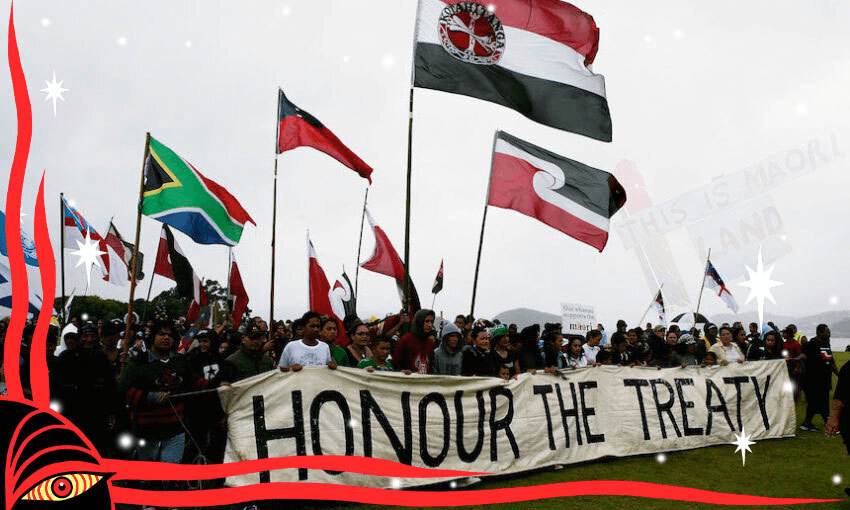The Green Party has outlined its plan to repair a flawed Treaty settlement process, including the return of privately owned land to Māori. Will the government take it on board? Te Kuru o te Marama Dewes takes a look.
The Green Party is challenging the government to consider the return of private land to Māori, and explore what that might look like in practice. Māori are disproportionately living below the poverty line in Aotearoa, and intergenerational poverty has been directly linked to land confiscation.
“Returning land to tangata whenua is the right thing to do to address the ongoing injustice that Māori experience,” said Greens co-leader Marama Davidson as she released Hoki Whenua Mai following Waitangi Day. A discussion document, it essentially looks at exploring a number of ways to repair a flawed Treaty settlement process.
The document outlines how giving land back to Māori could be beneficial not only for restorative justice and raising the wellbeing of Māori, but also how restoring tangata whenua as kaitiaki could have positive impacts for the environment.
“Nearly two centuries of land dispossession – much of which has been enabled by Crown policy – has caused an underlying, deep, foundational harm that Māori continue to experience to this day,” said Davidson in a statement.
The injustice of the New Zealand story has its origins with early European settlers, who subjected Māori to several massacres and atrocities. Through the implementation of the Doctrine of Discovery, the Crown illegally seized power and expelled Māori from their whenua, leaving Māori in a state of poverty, deprivation and marginalisation.
The discussion document points out that the Crown has ultimate bargaining power in the Treaty settlement process, and that iwi are getting a raw deal in a flawed and unjust process.
In a 2019 research paper, Dr Margaret Mutu (Ngāti Kahu, Te Rarawa and Ngāti Whātua), professor of Māori Studies at the University of Auckland and chairperson of Te Rūnanga-ā-Iwi o Ngāti Kahu, wrote, “Governments instigated the ‘treaty claims settlement’ process to extinguish all Māori claims, remove Māori rights and entrench colonisation. Research undertaken has shown that Māori loathe this process and do not accept that settlements are full and final.”
The total spend on historical Treaty settlements from 1985 to 2020 was $2.9 billion. This has been estimated to equate to less than 1% of the actual loss suffered. Compare that to the $12.1 billion Covid-19 wage subsidy package in 2020, and it paints a stark picture of how successive governments have negotiated Treaty settlement packages with iwi for the illegal confiscation of their land and cultural upheaval of Māori.
With the Waitangi Tribunal approaching its 50th year in 2025, the Green Party says it’s time to explore what actual restorative justice for tangata whenua looks like and how all New Zealanders can play a part in that.
The document makes several proposals, such as reassessing the role and powers of the Waitangi Tribunal to allow it to revise settlements, including recognising increased land values since redress was provided. “The concept of full and final settlement is unjust, and it is time for this to be revisited.” The establishment of a fund to enable whānau/hapū to reacquire dispossessed Māori land is also proposed, as the current framework of the settlement process, where only “large natural groupings” such as iwi can make claims, “creates barriers for full redress in both process and outcome”.
The Greens also propose restoring the powers of the Waitangi Tribunal to make recommendations in relation to privately owned land, something that was removed by the then National government in 1993. Most of the land that has been wrongfully alienated from Māori is currently privately owned, says the document, which adds, “The Crown needs to put more effort into returning private land, as it was instrumental in acquiring private land for sale to private interests in the first place.”
“We acknowledge those who have dedicated their lives to seeing tangata whenua get their land back. We know more and more people, Māori and non-Māori, want to be part of the solution,” said Davidson.
The suggestion is not being entertained by the prime minister and Māori-Crown relations minister Kelvin Davis, however.
Responding to Te Ao News, Davis said it was time to “move on and get on with things”, despite many iwi in his own constituency in Te Taitokerau having yet to settle.
The Green Party is asking for public feedback on options for returning land to tangata whenua, and will be holding a series of hui to hear ideas.
Follow The Spinoff’s te ao Māori podcast Nē? on Apple Podcasts, Spotify or your favourite podcast provider.

